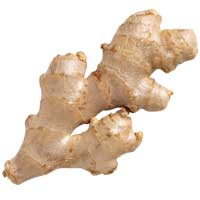Ginger

Preparation, Uses, & Tips
Fresh ginger can enhance many foods. It is widely used in African, Chinese, and Indian cuisines. Ground and fresh ginger both blend well with most seasonings, especially dried red chiles, cinnamon, cloves, bay leaves, and onions.
To use fresh ginger, slice off a one-inch piece, yielding approximately 1 tablespoon (6g) and trim away the peel; mince with a sharp knife or shred on the wide holes of a flat-sided grater.
To prepare ginger juice, which can be added to quick-cooked soups or delicate dishes, slice, peel, and mince the root; place it in a garlic press, and use the juice that is pressed out.
Dried ground ginger is not interchangeable with fresh ginger. If you do use ground ginger, it’s best in baked goods and desserts, such as gingerbread, cookies, and puddings. To substitute fresh ginger for ground, use 1 tablespoon (6g) fresh grated ginger to replace 1/8 teaspoon (0.2g) dried, ground ginger. It’s better not to substitute dry for fresh ginger in most Asian dishes.
Try a topping of freshly grated ginger over cooked vegetables such as yams, carrots, or collard greens. It’s also excellent in soups and stews, and it is a good choice for seafood since it neutralizes “fishy” odors. To flavor 1 pound (455g) of vegetables, tofu, or seafood, use 1 to 2 teaspoons (2–3g) grated ginger root (mild), 1 tablespoon (6g) minced ginger root (moderately hot), or 3 tablespoons (18g) minced ginger root (hot and spicy).
Of course, ground ginger is a key ingredient in favorites such as ginger ale, gingerbread, and gingersnap cookies.
Copyright © 2026 TraceGains, Inc. All rights reserved.
Learn more about TraceGains, the company.
The information presented in the Food Guide is for informational purposes only and was created by a team of US–registered dietitians and food experts. Consult your doctor, practitioner, and/or pharmacist for any health problem and before using any supplements, making dietary changes, or before making any changes in prescribed medications. Information expires December 2026.
